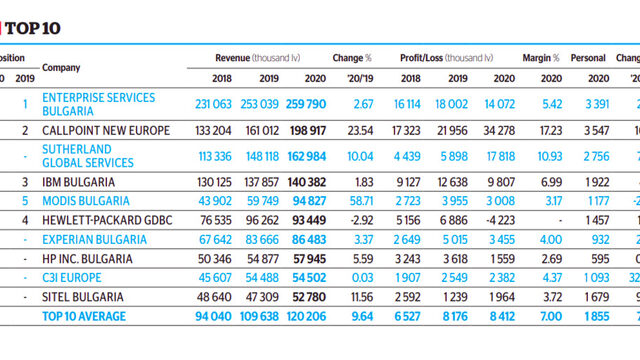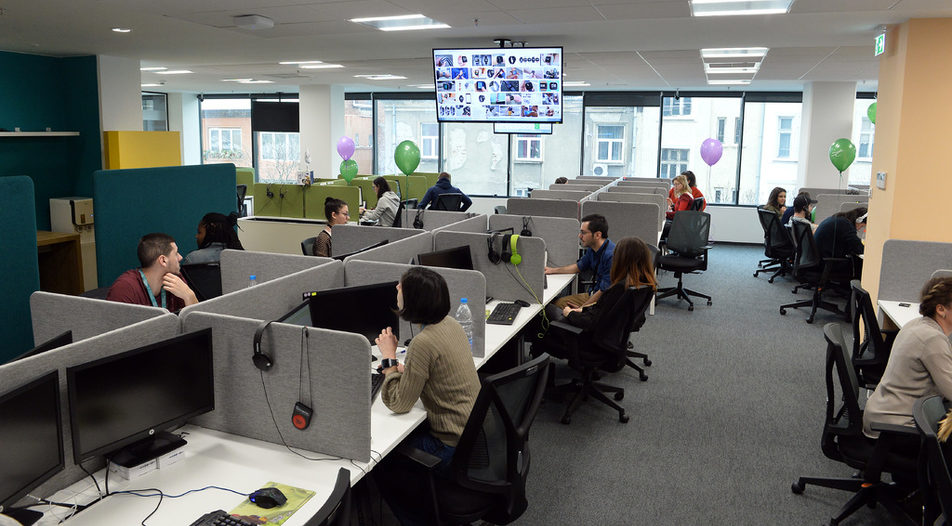- The outsourcing sector in Bulgaria has grown amid the pandemic: the overall revenue of the ten biggest companiei jumped 10% to 1.2b levs
- All ten biggest companies are foreign-owned, and leaders have not changed since last year's edition of K100 by Capital: Enterprise Services Bulgaria and Callpoint New Europe
- Salaries in the outsourcing sector - in Sofia and the rest of Bulgaria - are getting closer, even more so because of remote work
The outsourcing sector in Bulgaria was growing fast in recent years, unconcerned with economical shifts and stumbles. But 2020 made it face the biggest crisis since the start of its development in Bulgaria more than 15 years ago. The coronavirus hit many sectors, from which the clients of the outsourcing players come. Suddenly a lot of them lost big projects. Things got even harder, because all processes had to go remote. Around 90% of all employees started working from home. In the end, hardships were over and it turns out that the industry has grown again. The combined revenue of the ten biggest companies has grown 10 percent to 1.2 billion levs. The number of employees has also grown, along with the average profit.
The ten biggest companies have something in common: all of them are part of international groups. The first two have stayed at the top for the past several years and are among the biggest employers in the industry. Many of the players in the sector are doing a variety of services - from tech support to software development, which blurs the line between the outsourcing sector and the software sector, another industry, which K100 tracks annually.
The top 5
For a fourth year in a row, Enterprise Services Bulgaria leads the rankings. The entity is a result of the global merging of Hewlett-Packard Enterprise and Computer Sciences Corp. in 2016, which led to the establishment of DXC Technology. Enteprise Services Bulgaria is the heir to the long-time leader Hewlett-Packard Global Delivery Bulgaria Center. After the deal, two entities started working in the country - Enterprise Services Bulgaria and DXC Technology Bulgaria (formerly known as CSC Bulgaria), which has close to 400 employees. DXC Technology Bulgaria is part of the software developers rankings of K100, but both entities are owned by U.S.-based DXC Technology.
The outsourcing company has succeeded in inmaintaining its growth, with revenue reaching 259m levs in 2020, although profit fell a little. Employee headcount has also grown despite the hard year. The Bulgarian entity delivers a number of tech and other services to the global clients of DXC in countries such as Germany, USA and the UK.

Second is the company with the fastest growing business in recent years - Callpoint New Europe, which works in Bulgaria through the brand TELUS International Europe. It is part of Canadian telecommunications giant TELUS, which bought it in 2012. Revenue jumped 24% to 199m levs in 2020, taking Callpoint New Europe ever closer to the leader. Through its offices in Sofia and Plovdiv, Callpoint New Europe works for clients around the world, such as Google and Facebook. Last year the company added some new clients and expanded its footprint in the gaming area. Callpoint New Europe has the highest profit in the sector (34.3m levs, an impressive 55% jump year-to-year) as well as the biggest profit margin in the rankings. Third is another big and established player, which has been on the market for a number of years and has also been constantly growing -Sutherland Global Services Bulgaria, part of global group Sutherland. In the first months of the pandemic some of the big clients of the company, particularly those in the hotel sector, such as Hilton, and the transport industry, were hit hard. Their woes affected the Bulgarian entity, but despite that it managed to focus on other projects and continue its growth, in terms of both revenue and headcount. Margins also increased significantly, with net profit trebling up to 17.8m levs. Sutherland has office centers in Sofia, Burgas and Varna.
The fourth position goes to IBM Bulgaria, which has been operating for years. Revenues rose to 140m levs last year. In Bulgaria the entity works both for IBM and other non-domestic clients. It offers a variety of services - hardware and software, financial and accounting analysis, logistics and others.
Fifth is Modis Bulgaria, the successor to Adecco Bulgaria, which worked in the country as a hiring company and outsourcing center. International group Modis took over the outsourcing business. The entity is a leader in growth speed - in 2019 its revenue jumped up 36% to 60m levs, while a year later it grew even faster - by 59% to 95m levs.
This year even more
Only one company among top 10 has a slightly lower revenue in 2020, compared to 2019. Another one has a slightly lower number of employees. Forecast for this year is that the industry is going to continue growing, even faster than in 2020. According to industry association AIBEST, there have been 81 thousand employees in the outsourcing sector, with data as recent as mid-2020. It also predicts that in 2022 the industry will contribute 8.9% of Bulgarian GDP. The coronavirus has changed the sector and most of the companies are still operating out of office but the crisis has surely made the outsourcing industry more resilient and adaptive. The other strong trend that has been amplified by remote work is that salaries in outsourcing are growing, with the gap between Sofia and other cities getting smaller.
- The outsourcing sector in Bulgaria has grown amid the pandemic: the overall revenue of the ten biggest companiei jumped 10% to 1.2b levs
- All ten biggest companies are foreign-owned, and leaders have not changed since last year's edition of K100 by Capital: Enterprise Services Bulgaria and Callpoint New Europe
- Salaries in the outsourcing sector - in Sofia and the rest of Bulgaria - are getting closer, even more so because of remote work
The outsourcing sector in Bulgaria was growing fast in recent years, unconcerned with economical shifts and stumbles. But 2020 made it face the biggest crisis since the start of its development in Bulgaria more than 15 years ago. The coronavirus hit many sectors, from which the clients of the outsourcing players come. Suddenly a lot of them lost big projects. Things got even harder, because all processes had to go remote. Around 90% of all employees started working from home. In the end, hardships were over and it turns out that the industry has grown again. The combined revenue of the ten biggest companies has grown 10 percent to 1.2 billion levs. The number of employees has also grown, along with the average profit.












